|
|
Wednesday, August 22, 2012
Dana Warnez: Bar Leadership Runs in the Family
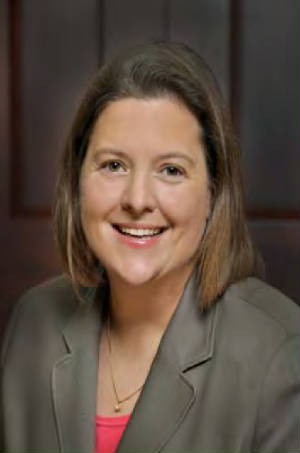 Recently, Dana M. Warnez became the 84th President of the Macomb County Bar Association. For many in our profession, that achievement and responsibility would be enough. Not for Dana. Next
month, during the State Bar's Annual Meeting, she'll also be sworn in as the next Chair of the State Bar of Michigan's Representative Assembly. Recently, Dana M. Warnez became the 84th President of the Macomb County Bar Association. For many in our profession, that achievement and responsibility would be enough. Not for Dana. Next
month, during the State Bar's Annual Meeting, she'll also be sworn in as the next Chair of the State Bar of Michigan's Representative Assembly.
Some might say that leadership is in Dana's blood. Many of us recall Dana's sister, the late Kimberly
Cahill, who was President of the Macomb County Bar Association and President of the State Bar of Michigan. Their mother,
Florence Schoenherr-Warnez, practices law along with Dana. Florence, a pioneer in her own right, was the inspiration
that led both Kim and Dana to pursue the practice of law.
The months ahead will bring us more information
about this energetic and talented lawyer whom I'm immensely proud to call my friend. For now, congratulations,
Dana, for what you have accomplished so far and for your dedication to the bar. Alao, thank you, Florence,
for bringing us two wonderful daughters and for showing them leadership by example.
Tuesday, August 21, 2012
Commemorating Michigan's History -- and Thanking Nancy Brown
Next Tuesday, August 28th, a dedication
ceremony will take place at the Michigan Capitol building commemorating the State Bar’s 37th Michigan Legal Milestone that recognizes the Elliot-Larsen Civil Rights Act.
The State Bar Michigan Legal Milestone program began in 1986. Until
recently, few knew that Nancy Brown, the SBM’s Director of Member Services and Communications, played a huge role in
its creation and development. That changed a few months ago when Nancy received the Michigan Historical
Commission and DNR’s 2012 Governor John B. Swainson Award for her work with this highly successful, long-standing program.
As the state’s website put it:
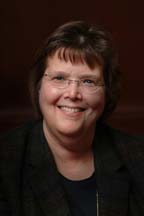 "Nancy Brown, of Williamston, has worked for the State Bar of Michigan for more than 36 years, overseeing its communications
division. She has been instrumental in developing and nurturing the Michigan Legal Milestones program, inaugurated in 1986,
making Michigan's rich legal history accessible to everyone. The program's bronze plaques highlight significant decisions,
trials, events and people who have made an impact on Michigan's history, landscape and laws. Each milestone is a unique story,
and the program serves as a vehicle to tell that story, no matter how contentious it may be. "Nancy Brown, of Williamston, has worked for the State Bar of Michigan for more than 36 years, overseeing its communications
division. She has been instrumental in developing and nurturing the Michigan Legal Milestones program, inaugurated in 1986,
making Michigan's rich legal history accessible to everyone. The program's bronze plaques highlight significant decisions,
trials, events and people who have made an impact on Michigan's history, landscape and laws. Each milestone is a unique story,
and the program serves as a vehicle to tell that story, no matter how contentious it may be.
"Topics covered by the Milestones include historic Michigan trials, the work of crusaders for justice, the legality
of Native American tribal laws and customs, woman suffrage, the fall of McCarthyism, eminent domain, and the end of Jim Crow
laws. This law-related educational focus is unique and would be lost without Nancy's guiding hand, oversight and careful budgeting."
I’ve long called Nancy a “work horse” at the State Bar, and I’ve said that based
on decades of experience seeing her in action. Nancy is the former Editor of the Michigan Bar
Journal and former Director of Communications. She’s tremendously creative and can always be
counted on to get things done – and done well. This past year, I’ve been especially grateful
for her hard work on the Practice Management Resource Center and its “Practice EZ” component.
Please join us for the dedication ceremony of the bar’s 37th Michigan Legal Milestone,
at noon on Tuesday, August 28 in the State Capitol Building. You can find more information on the State
Bar Legal Milestone program, and past milestones, here.

11:03 am edt
Monday, August 20, 2012
A Relationship-Building Seminar (Yes, it's Law-Related)
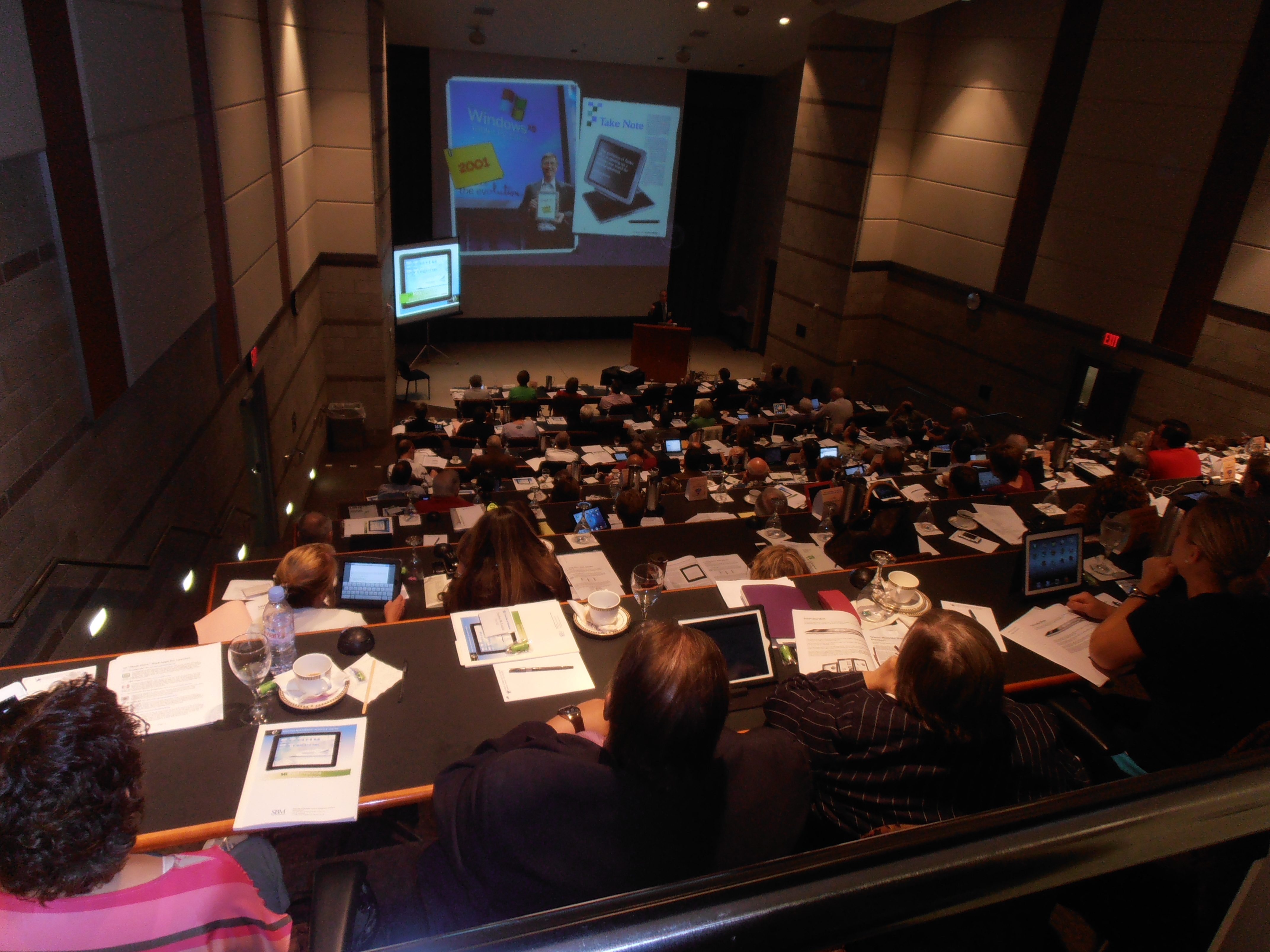 Early this morning, I looked into a packed conference room in Lansing and saw lawyers and judges eagerly powering up their
iPads. Though I didn't stay long (I merely offered welcoming remarks in my presidential capacity ... and
I don't own an iPad yet), I knew that when the program ended, everyone would come away with a much stronger
working relationship with their iPads. Early this morning, I looked into a packed conference room in Lansing and saw lawyers and judges eagerly powering up their
iPads. Though I didn't stay long (I merely offered welcoming remarks in my presidential capacity ... and
I don't own an iPad yet), I knew that when the program ended, everyone would come away with a much stronger
working relationship with their iPads.
This was the State Bar's second iPad seminar of the year.
The bar brought in a knowledgeable, well-regarded national speaker and developed an ambitious, fast-moving agenda. Like
the bar's last iPad seminar, called "Trial by iPad," it was sold out, with a long waiting list. Based on popular demand,
the bar plans to offer more of these seminars in the coming months.
These are some of the many
innovative offerings of the bar's Practice Management Resource Center. JoAnn Hathaway and Diane Ebersole head the center, and through it have worked hard to help Michigan lawyers
manage their practices, improve their work/life balance, and work better with technology. Their boss, Nancy Brown,
Director of Member Services and Communications, plays a very important role in the center, as well.
I
encourage everyone to visit the State Bar's PMRC and return frequently (it continually undergoes improvements and
advances). Watch for more seminars and programs offered through teh center. And of course, please let me or the
State Bar know if there's anything that we can do to serve you better.
Thursday, August 16, 2012
Honoring Morris Dees of the Southern Poverty Law Center
August 7, 2012,
was my last day in the ABA House of Delegates as SBM President. That meeting left an indelible impression
not only because it marked the end of ABA service I’ve treasured but it also allowed me to see Morris Dees of the Southern Poverty Law Center receive the ABA’s highest honor, the American Bar Association Medal.
ABA President Bill
Robinson commented that Dees “showed courage and leadership as one of the greatest civil rights lawyers of our time.”
“Courage” is certainly an understatement considering that Dees’s office has been firebombed
and his family’s lives threatened throughout the decades of his career.
Standing before the House of Delegates —a group of hundreds of eloquent and accomplished lawyers—Dees gave a moving, unforgettable acceptance speech that had us glued to his every word. He began by commenting (6:50 on the video) that the ABA’s award “erases
all that loneliness and tough fights that I’ve been through …” as a civil rights lawyer in the deep south
in the 60’s and 70’s. He thanked the judges, juries, and clients he has encountered in his
career. I’ll never forget the story he shared about one of his clients, Beulah Mae Donald (14:30),
whose son Michael was lynched by a Ku Klux Klan group. The criminal trial had already ended, and Dees handled
the civil case against the klan group responsible for Michael’s death in an Alabama court. A
former klansman had turned over key evidence that was used in both the civil and criminal trials. Dees
recounted how the witness/former klansman, while testifying in the civil trial, was crying from the witness stand; in open
court, that witness asked Mrs. Donald if she’d forgive him for his role in her son’s lynching. Her
answer was: “Son, I’ve already forgiven you.” Dees commented that if he lived
to be another hundred years or tried a thousand more cases, he doubts he’d ever be more moved than when he heard her
answer. Even the judge could be seen fighting off tears. Later that day, the jury returned
a verdict against the klan for $7 million.
I strongly encourage everyone to watch or hear Dees’s speech. Maybe you'll be left misty eyed like me, but you'll unquestionably be proud that you entered
this profession.
9:26 pm edt
Monday, August 6, 2012
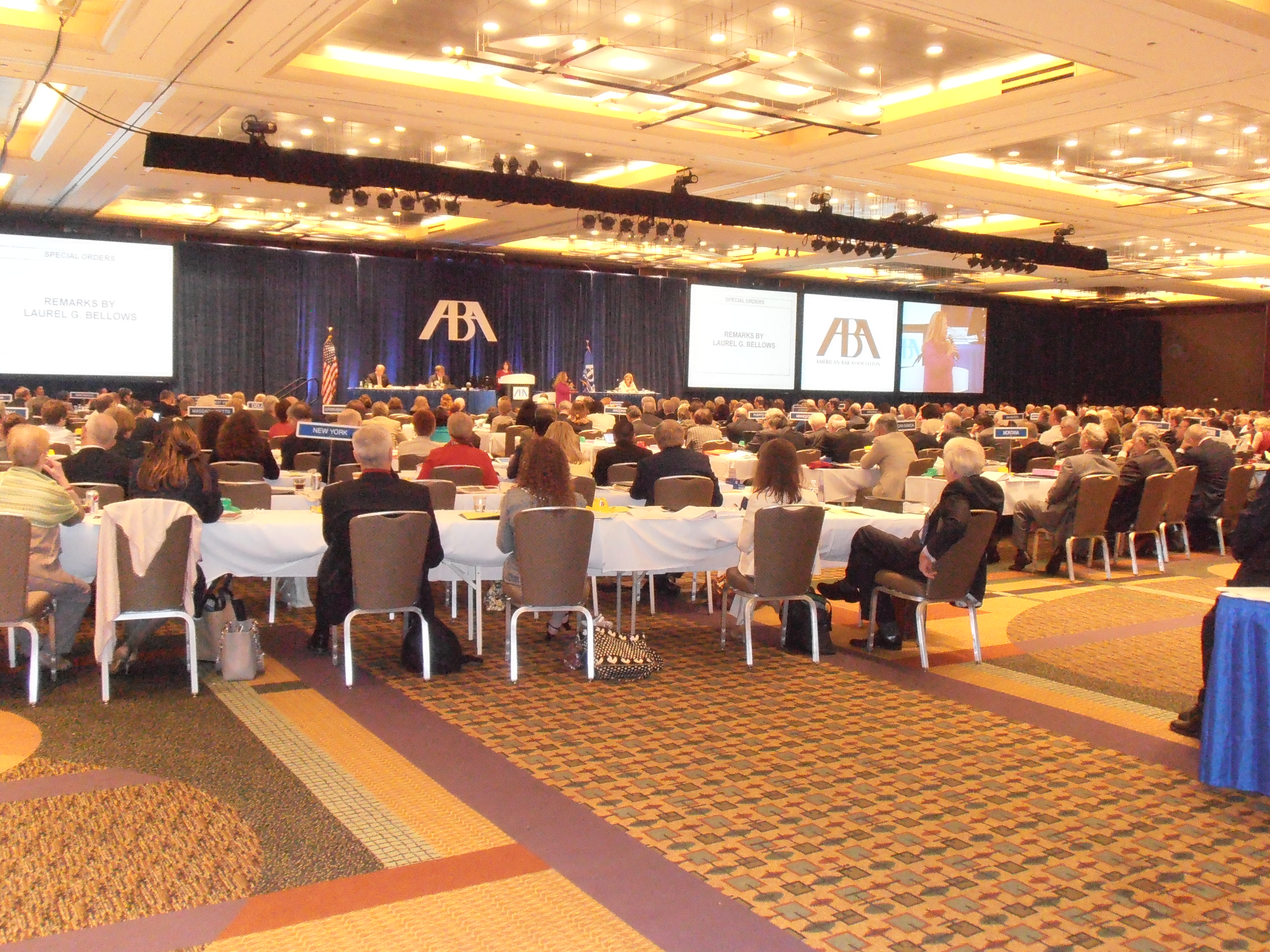 Day #1 of the ABA House of Delegates blended the ceremonial and the downright serious. The ceremonial front included passing the gavel of the
ABA presidency to Laurel Bellows of Chicago. The serious front included several resolutions for debate
and vote, including resolutions and reports submitted by the ABA Commission on Ethics 20/20. This commission, after a three-year study of the effects of globalization and technology on the practice
of law, set forth six proposals. You can find a link to them here. Day #1 of the ABA House of Delegates blended the ceremonial and the downright serious. The ceremonial front included passing the gavel of the
ABA presidency to Laurel Bellows of Chicago. The serious front included several resolutions for debate
and vote, including resolutions and reports submitted by the ABA Commission on Ethics 20/20. This commission, after a three-year study of the effects of globalization and technology on the practice
of law, set forth six proposals. You can find a link to them here.
One of the proposals involved lawyer solicitation in the age of social media and Internet marketing.
When the Model Rules of Professional Conduct were drafted, nobody envisioned that these would exist.
The House of Delegates approved revisions to Model Rule 7.3 [FYI, here’s a link to Michigan’s rules], regarding contact with prospective clients, and approved substantive changes within the comments. Among
them were these additional comments that seek to clarify when online communications generate attorney/client relationships:
[1] A solicitation is a targeted
communication initiated by the lawyer that is directed to a specific person and that offers to provide, or can reasonably
be understood as offering to provide, legal services. In contrast, a lawyer’s communication typically
does not constitute a solicitation if it is directed to the general public, such as through a billboard, an Internet banner
advertisement, a website or a television commercial, or if it is in response to a request for information or is automatically
generated in response to Internet searches.
The House unanimously adopted this language
within the commentary along with other amendments to Rule 7.3. Clearly, the underlying basis for these
and other proposals was protection of the public. The Ethics 20/20 Commission promised more proposals for
consideration when the House of Delegates meets again in February 2013. By then, my service as a
Michigan delegate will have concluded (this is my last meeting), but those interested can follow the commission’s work
through its website and, of course, notify the ABA or the State Bar of your comments and concerns.
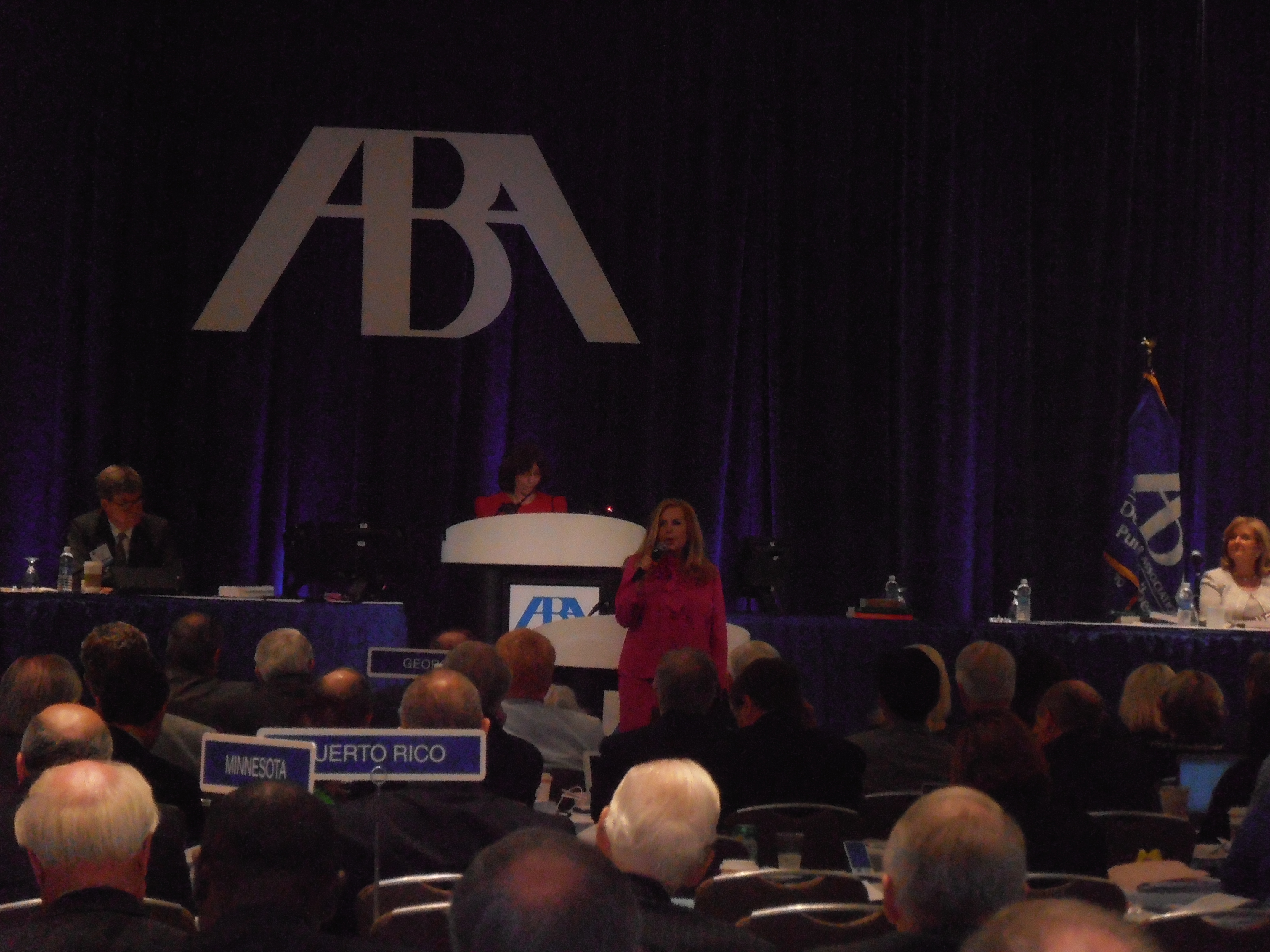
2012-2013 ABA President Laurel Bellows (center) addresses
the ABA House of Delegates.
Saturday, August 4, 2012
Meet Karol Corbin Walker, 2012-2013 NCBP President
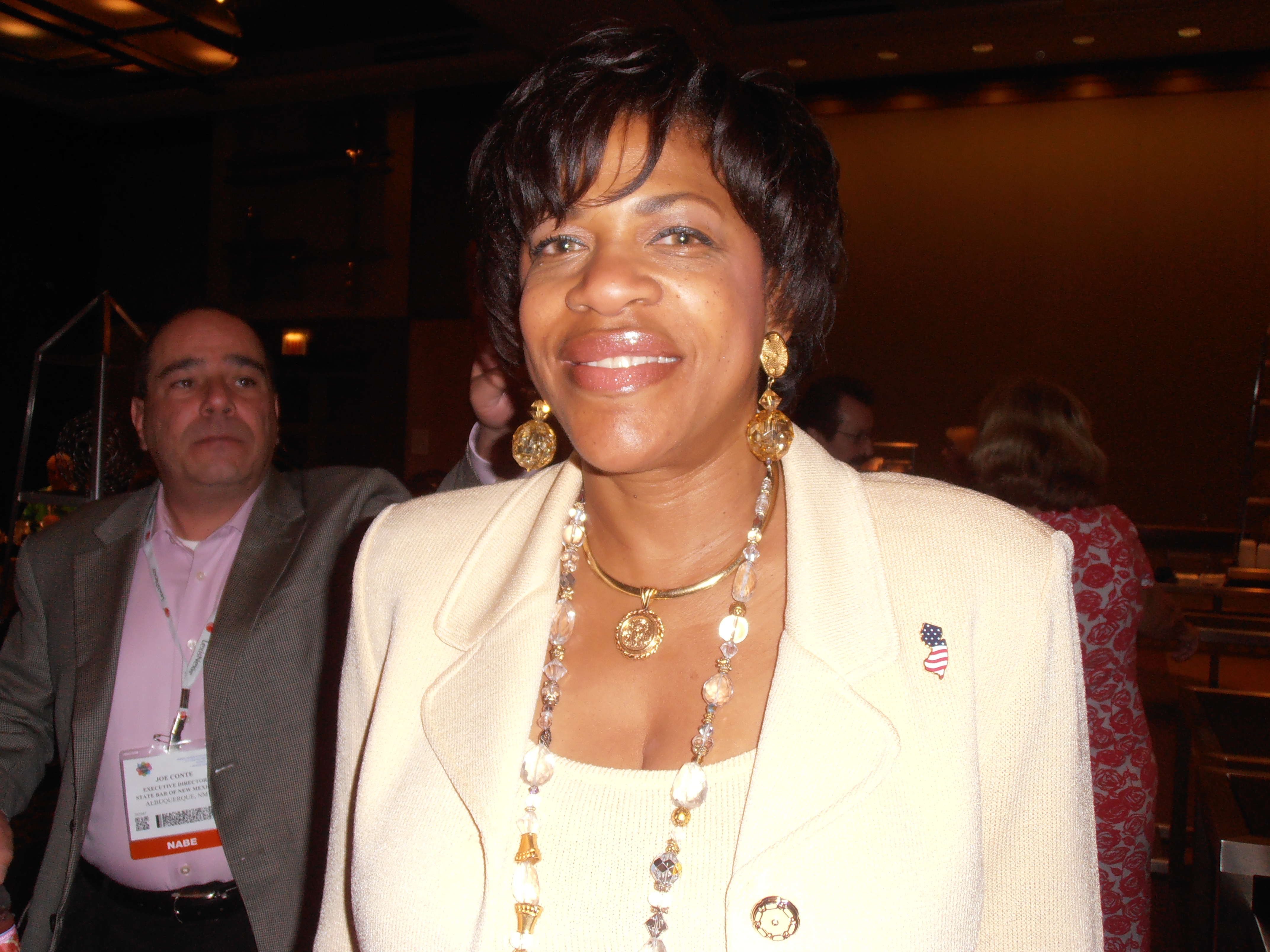 The National Conference of Bar Presidents (NCBP) just wrapped up its meeting
here in Chicago. The NCBP is led by past bar association presidents, state and local, who try hard to keep
their collective fingers on the pulse of our profession and also share their institutional memories so that existing bar presidents
and presidents-elect can plan effective terms for the betterment of their members and the public. Some
of its meetings and events coincide with those of the National Association of Bar Executives, which holds the bulk of its
meetings a day or two earlier. The National Conference of Bar Presidents (NCBP) just wrapped up its meeting
here in Chicago. The NCBP is led by past bar association presidents, state and local, who try hard to keep
their collective fingers on the pulse of our profession and also share their institutional memories so that existing bar presidents
and presidents-elect can plan effective terms for the betterment of their members and the public. Some
of its meetings and events coincide with those of the National Association of Bar Executives, which holds the bulk of its
meetings a day or two earlier.
The NCBP has also generated ABA leaders. Laurel Bellows, the 2012-2013 ABA President,
is a past NCBP President. Closer to home, the late George E. Bushnell, Jr., past president of the State
Bar of Michigan and the ABA, was also President of the NCBP.
Before this year’s NCBP Annual Meeting concluded, the gavel was passed to Karol
Corbin Walker as its 2012-2013 President. Karol allowed me to take this picture after I introduced myself
and warned her that she’d be the subject of my newest blog post. (I’m keeping my threat.)
Karol embodies essential ingredients we expect in leadership:
warmth, sincere dedication, intelligence, selflessness, and a healthy supply of exuberance. In 1995, Karol
became the first African American woman to attain partner status at any major law firm in New Jersey. In
2003 she became the first African American President of the New Jersey State Bar Association in its 105-year history.
Congratulations, Karol! Best wishes for a wonderful year at the helm of the NCBP!
Bar President Education During the ABA Annual Meeting
You would think that bar
association service — which, for me, has been a 23-year sustained
effort —
and everyday law practice would keep me aware of issues facing the profession. Not quite. As
a State Bar President-Elect and President, I’ve had the privilege of attending meetings of the National Conference of
Bar Presidents (NCBP) that coincide with the ABA Mid-Year and Annual Meetings. The NCBP helps bar association presidents learn about current and emerging issues affecting our profession
and offers suggestions and support. Another benefit of the NCBP conference is that it offers a valuable opportunity
to meet leaders of other bar associations around the country. Let me share with you two of the NCBP
workshops I attended on Friday.
Stemming the Exodus of Women from the Profession: A Roadmap for Bar Associations. “This is
not a pipeline issue,” Deborah Epstein Henry, author of the book Law & Reorder, told us. The problem is not encouraging women to become lawyers.
Rather, the problem is keeping them in the profession after they graduate from law school. As
the session began, Henry shared sobering statistics. She explained that for the last 25 years, women have
composed 40-50% of law school classes. Yet, only 15% of equity partners and 25% of non-equity partners
are women. Women have been leaving private practice in significant numbers. Henry explained
that 31% of private practitioner women leave during their careers. Where do they go? 37% go in house, 24%
work in a non-legal capacity, 22% are unemployed, 8% work for non-profit entities, and 9% seek government employment.
Two reasons for the change: lack of work-life balance and lack of satisfaction with their careers. The
session discussed the impact on our profession and the role of bar associations as well as law firms in slowing down the exodus.
Global
is Local: What You Should Know About Globalization and the U.S. Legal Profession. This eye-opening workshop addressed the reality
that globalization of law practice is here, and it affects practically every field of practice. Setting
the stage is the fact that more of us have clients with legal matters outside of the United States. 32
of the Fortune 1,000 companies are in Michigan. Michigan is a major exporting state. A
sizeable percentage of our population is foreign-born. The U.S. entered into 14 free trade agreements,
but state bar associations had no input. Virtual law offices are emerging. As our profession
changes what, if anything, can a bar association do? How should bar associations regulate?
The conference concludes on Saturday, but the American Bar Association
Annual Meeting is far from over. Please check back for more updates.
1:02 am edt
|
|
About Me - Updated in 2025
Thank
you for visiting my State Bar presidential blog. My name is Julie Fershtman, and I was the 77th president of the 42,000-member State Bar of Michigan from September 2011 through
September 2012. A member of the State Bar for over 38 years (as of 2025), I practice with the
law firm Foster Swift Collins & Smith, PC, in its Southfield office, where I'm an Equity Shareholder.
My areas of practice include commercial litigation, insurance defense and coverage, sporting and recreational liability,
fraud litigation, agribusiness law and liability, real estate litigation, and equine law. I've tried cases before
juries in 4 states (Michigan, Ohio, Illinois, and Connecticut) and have been counsel on cases in 21 jurisdictions nationwide.
Back in 2011-2012, business continued during my presidency with assistance from a great Board of Commissioners, a supporive
Executive Director, lawyers in my firm, and the cooperation of fellow counsel and judges. Aside from my law practice, I
also enjoy speaking and lecturing on liability, insurance, and risk management at seminars, conventions, CLE programs,
and conferences. I've been a speaker in 29 states across the country. Around the time of my State Bar presidency, I spoke
on a panel at the 2011 ABA Annual Meeting in Toronto. I was also a panelist on ABA webinars in 2011 and 2012. I also love writing on legal subjects. I've written 4 books and have contributed to or co-authored 4 ABA books and 5 law journal articles for the ABA Tort Trial & Insurance Practice
Section. My writings also include about 425 published articles on legal subjects. In 2019, the ABA published my latest
book, called Equine Law and Horse Sense, which is available through ABA Publishing and Amazon (look for the horse
on the cover). I grew up in the Detroit area and graduated from Emory
College and Emory Law School. On a personal level, my father (the late Sidney Fershtman) was a Michigan lawyer,
and my husband is a lawyer. Although work, family, and bar activities leave little time for hobbies, my favorite hobby
is horses. My personal website explains more about my
background and law practice: www.fershtmanlaw.com
|
